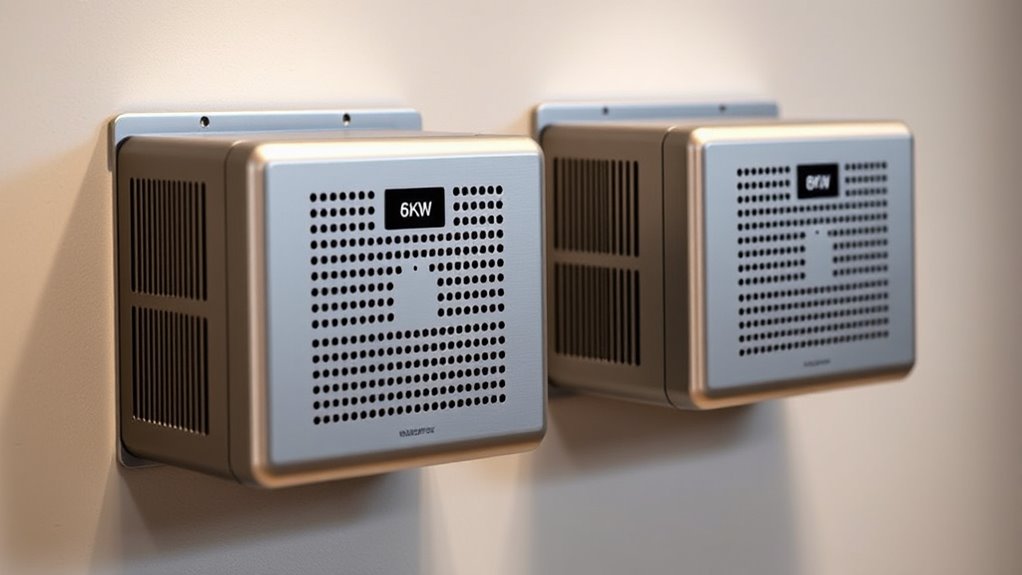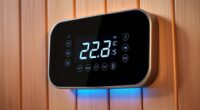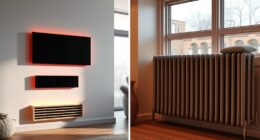Understanding kilowatt ratings helps you compare heaters effectively. A 6 kW heater uses less energy and produces less heat than an 8 kW model, making it better suited for small or well-insulated spaces. The higher wattage of an 8 kW heater provides quicker and more powerful heating, ideal for larger areas. Knowing these details helps you choose the right heater for your needs and avoid electrical issues. Keep exploring to find out how to pick the best option.
Key Takeaways
- A 6 kW heater consumes less energy and produces less heat than an 8 kW heater, affecting heating speed and capacity.
- Higher wattage heaters draw more electrical current, requiring suitable wiring and electrical system capacity.
- 6 kW heaters are ideal for small, well-insulated spaces, while 8 kW models suit larger or open areas.
- Choosing the right kW rating ensures effective heating and energy efficiency, preventing under- or over-sizing.
- The extra power of an 8 kW heater may increase costs without significant benefits in smaller or well-insulated rooms.

When choosing a heater, understanding its kilowatt (kW) rating is vital. This number tells you how much power the heater consumes and how much heat it can generate. A 6 kW heater uses less energy than an 8 kW heater, but that doesn’t automatically mean it’s less effective. Instead, it’s about matching the heater’s capacity to your space and needs. The kW rating directly influences the electric current the heater draws from your electrical system. Higher wattage heaters will pull more electric current, which can impact your circuit’s safety and performance. If your home’s wiring isn’t rated for a higher current, using an 8 kW heater may cause circuit overloads or tripping breakers. So, it’s essential to consider your home’s electrical capacity when choosing between these options.
Power efficiency is another key aspect linked to kilowatt ratings. A heater with a higher kW rating produces more heat in less time but also consumes more electricity. Conversely, a lower-rated heater might take longer to warm a space but could be more energy-efficient over time if your heating needs are moderate. The efficiency isn’t just about how much power a heater uses but how well it converts that power into useful heat. Some models are designed to be more energy-efficient, offering better heat output for the same amount of power. When comparing a 6 kW versus an 8 kW heater, think about whether the extra power will notably improve heating performance or just increase your energy bills. If your space is small or well-insulated, a 6 kW heater might do the job just fine and save you money on electricity. For larger or more open areas, an 8 kW heater may be necessary to achieve comfortable warmth quickly. Additionally, understanding the comparative advantage of different heater sizes can help you make more informed choices aligned with your specific needs.
Frequently Asked Questions
How Do I Choose Between a 6 Kw and 8 Kw Heater?
You should choose between a 6 kW and 8 kW heater based on your space and heating needs. An 8 kW heater heats faster but costs more to operate, so consider your budget for ongoing energy costs. Also, check safety considerations, ensuring your electrical system can handle the higher wattage safely. If your space is smaller, a 6 kW might suffice and save you money.
Are Higher Kilowatt Ratings More Energy-Efficient?
It’s ironic, but higher kilowatt ratings aren’t necessarily more energy-efficient. Instead, they may use more power consumption, leading to increased energy costs and less savings. A more powerful heater heats faster but doesn’t promise better energy savings. So, if you want efficiency, focus on proper sizing and insulation rather than just choosing a higher kilowatt rating. Sometimes, a smaller heater does the job with less energy waste.
Can My Electrical System Support an 8 Kw Heater?
Your electrical system might support an 8 kW heater if your wiring and circuit breaker are rated for that power level. Check your electrical wiring’s capacity and confirm your circuit breaker can handle the increased power consumption. If unsure, consult a licensed electrician. They can verify whether your system can safely support an 8 kW heater without risking overload or electrical issues.
How Does Heater Size Affect Installation Costs?
Imagine upgrading your heater to an 8 kW model, and suddenly your installation costs rise. Larger heaters increase power consumption and often require more complex wiring, making installation more expensive. For example, a homeowner found their costs doubled when switching from a 6 kW to an 8 kW heater due to added electrical system upgrades. So, heater size directly impacts installation complexity and overall costs.
Do Kilowatt Ratings Impact Heater Lifespan?
Higher kilowatt ratings can influence your heater’s lifespan, but mainly through increased power consumption. If you regularly run an 8 kW heater at full capacity, it may experience more wear and tear, reducing equipment durability over time. However, proper maintenance and correct usage help mitigate this. So, while higher ratings can potentially shorten lifespan, taking care of your heater ensures it stays reliable longer.
Conclusion
So, whether you choose a 6 kW or 8 kW heater, remember it’s all about your space and warmth needs. Think of it like fitting the right key to the lock—grab the one that opens up comfort without wasting energy. In the end, understanding these ratings helps you make smarter choices, turning your home into a cozy haven. After all, isn’t it better to control the heat than let it control you?









